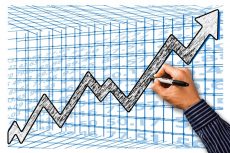Everyone understands the concept of profit right? Well, apparently not, although it’s not their fault. Everyone thinks they understand, and on one level they might. Let’s talk a little bit about profit, and what’s going on with the economy right now.

geralt via Pixabay
First, the generic discussion about profit. One achieves profit when they have money left over after taking care of their expenses. That’s a very simplistic vision of profit, but I want to start simply. For personal wages, if, after you get paid, you can pay your bills and still have some money left over, you’ve earned a “profit”. Now, you might squander that money needlessly later on, but you did have a profit for awhile.
How much profit you have will be determined by a few things, some of which were covered above. Let’s use a figure of $500. You bring home $500 a week. In that week you had to spend $250 on whatever; that left you with a profit of $250, or 50%. Say you wanted to buy a new CD player that cost you $150; that would still leave you with a profit of $100 for the week if you didn’t spend another dime, or around 20%.
Sounds pretty good, right? It might, but you probably still need spending money for the week, so that’s going to eat into your profit. I know what you’re thinking, though; you get paid again the next week, and have another opportunity to get ahead. True, but you’ll possibly have more bills, and want to buy more stuff.
So, now you’re thinking “Hey, I have a credit card; I’ll buy the CD player on the credit card.” That’s not a bad idea in general, and you’ll still have your $250, but why are you using the credit card? If you’re using it so you can hold onto the money and pay off the bill when it comes, and you’re doing that because you’re saving other money so that, when you pay off your credit card bill you’ll have reserve funds, good deal.
If not, and you just want to spend that money on other things, suddenly you don’t have a profit anymore. Oh sure, in your mind you still have a profit if you spent that $150 on other stuff you probably didn’t need because you put the CD player on your credit card, but actually you’re now in the hole $50; $250 initial outlay, $150 on the credit card, another $150 spent on stupid stuff, which comes to $550. You only get paid $500 a week, and you’re in the hole.
Okay, so you make it through the rest of the week by only spending $50 of that $100 you had left, which now leaves you in the hole, or deficit, for $100. The next week you’ve gotten paid another $500, which should put you back ahead by $400. But, once again, you have another $250 you have to spend on bills, then you need to buy $100 worth of groceries, and you want to buy some new clothes, which will cost you $100.
You decide to put that on the credit card again, and decide to go out over the weekend to show them off. You end up spending $75 on Saturday night. But you feel good, because you’re sitting on $225 and you’re living large. Well, not really, because you started the week in the hole $100, spent $250 on bills, $100 on clothes on the credit card, and $75 on going out. You’re now actually in the hole $125, and you still need spending money for the week.

StockSnap via Pixabay
Third week is over, and because you felt like you had extra money, you splurged just a little bit more this week, spending $125, knowing you still had $125 in your pocket. Sorry to tell you this, but you’re now $250 in the hole before you get paid, and once you’re paid your “profit” for 3 weeks is only $250.
You have two big bills this week, though; rent and the credit card bill has arrived. Rent is $400 (you live cheaply), and the credit card bill only shows the first week’s purchase, which means it’s for $150. You have $625, and don’t want to spend it all. You know you have to pay the rent, which will leave you $225, and don’t want to pay the entire credit card bill because it won’t leave you with much afterwards. But you can pay the minimum amount, which is $25; sweet! You’re now left with $200, and feeling like you’re doing well.
Sorry to burst your bubble, but remember, when you got paid, you were only really up $250. After paying rent, you were in the hole $150; after paying the credit card bill you’re now down the $25 you paid, but still in the hole for not only $125, but the other $100 in clothes you haven’t paid for yet.
After 3 weeks, your deficit is $400, and you only have $200, and you’re probably going to eat into that. You think you have a profit because you have some cash, but you don’t. This is why you don’t understand what a profit is.
Now, let’s move this to a larger scale, mega corporations. This is what they do all the time. A company projects its profit based on historical record. It then borrows against that perceived profit, like you do with a credit card, and makes purchases of some kind, sometimes just to cover payroll. Sure, they have cash, but they want to use that in other ways.
Over time, they start generating big bills, but they’re not worried because they know that same money they’ve always gotten is going to come again. Only, suddenly, it’s not coming in the same way. The figure is down only 15%, but that’s enough to make the company realize that they can’t go on with business as usual without making some changes.
At first, they think it’s temporary because it’s never happened before, so they just borrow a little bit more, still living off history. Only it’s not a fluke; it keeps going in the wrong direction. Suddenly, this company that was posting these big profit numbers is in trouble, because, in reality, they weren’t profiting at all; they were in debt, it was growing, and now they don’t know what to do. They may have the cash to pay off all the debt that’s immediately due, but if they use it then they can’t make payroll. What to do, what to do,…
This is just a small scenario, but I hope it explains, to a small degree, just what happens when companies say they make profits, yet are still in trouble. They tend to do what regular people do, only on a grander scale. They speculate, sometimes forgetting to take reality into account, and then when things start going bad they’re unsure how to handle it. Layoffs, bankruptcy, etc; that’s what they do. And that’s if they made a profit; if they didn’t make a profit, things escalate on a faster scale towards negative ends.
I’ve tried to make this simple, and I hope I’ve succeeded. There are some lessons we all need to try to learn so that we can get out of these types of problems; I’m probably going to share some of these later on, as we work our way out of our personal financial messes.